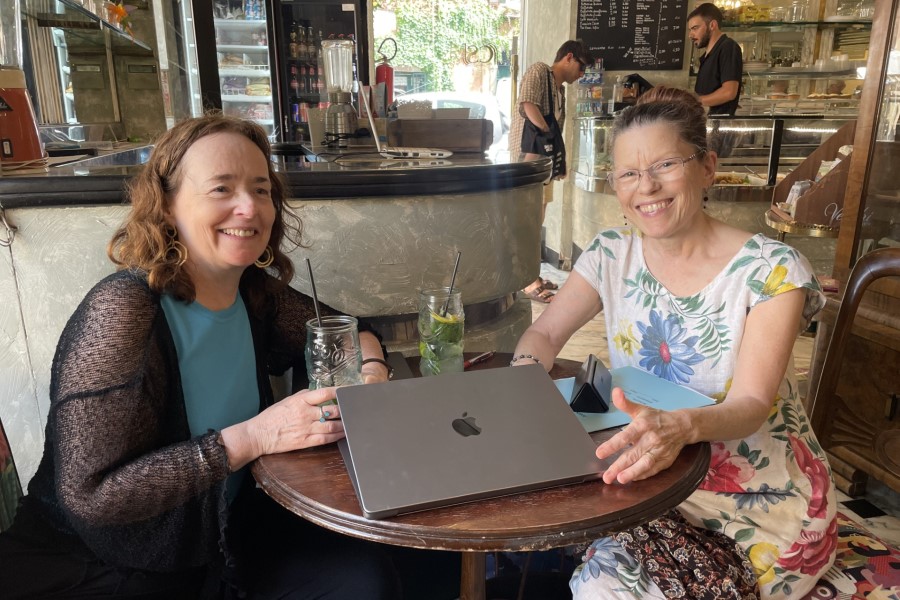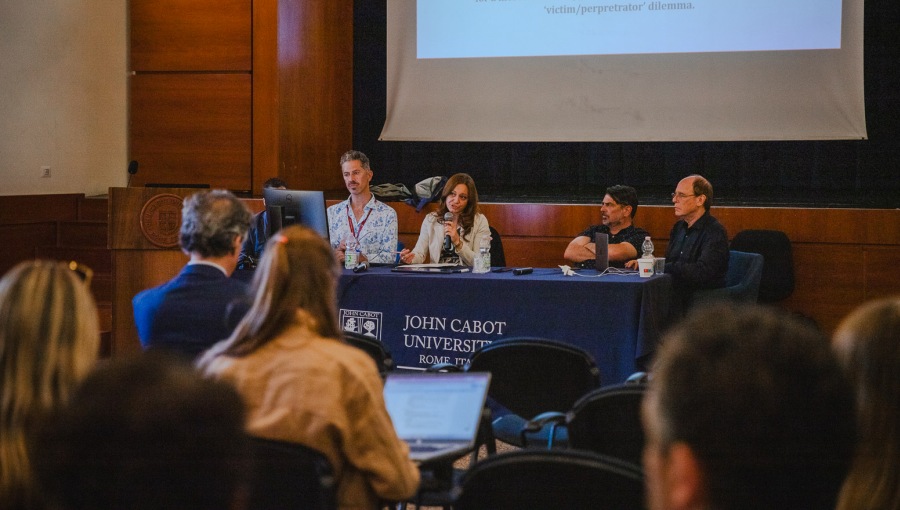Faith-Based Organizations and the Prevention of Human Trafficking
John Cabot University welcomed Father Fabio Baggio, head of the Section of Migrants and Refugees at the Dicastery for Promoting Integral Human Development, for a talk entitled “Faith-Based Organizations and the Prevention of Human Trafficking” (HT) on February 4, 2020.

Father Fabio Baggio
The panel discussion included Pietro Sebastiani (Italian Ambassador to the Holy See), Marina Mazzini (Executive Direction and Management Department at UNICRI – United Nations Interregional Crime and Justice Research Institute), and Professor Silvia Scarpa (JCU Lecturer in Human Trafficking). Michael Driessen, JCU Professor of Political Science, moderated the discussion.
Co-sponsored by the Department of Political Science and International Affairs and the Office of Community Service, Religious Life & Multiculturalism, the event focused on the role faith-based organizations have in responding to HT. The discussion stemmed from a recent handbook produced by Baggio’s Migrants and Refugees Section entitled Pastoral Orientations on Human Trafficking.
Pastoral Orientations on Human Trafficking
The purpose of the handbook is to provide a reading of HT that enables its understanding and proposes possible solutions to end this abhorrent phenomenon. The handbook was compiled by the Migrants & Refugee Section (M&R), a small action-oriented Holy See office established in 2017 by Pope Francis, to address HT, as well as general migrants and refugee matters.
The Pastoral Orientations handbook was conceived to help Catholic dioceses, parishes, and religious congregations, as well as schools and universities, in planning, establishing, conducting and evaluating the actions aimed at overcoming HT. It also serves as a reference point for homilies, education and the media.
The structure of the handbook as explained by Fr. Baggio, is very simple: a short legal preface defines HT as “the recruitment, transportation, transfer, harboring or receipt of persons, […] for the purpose of exploitation.” The handbook is then divided into 10 sections that analyze the facts and challenges of the phenomenon. The sections are the following: commodification and exploitation of human beings, the demand aspect, reluctance to acknowledge the dire reality of HT, identifying and reporting HT, the business connection, working conditions and supply chain, HT and migrant smuggling, bolstering cooperation between States and institutions, providing support to HT survivors, and, lastly, promoting reintegration.
During the event, all panelists commented on the timely relevance of the Pastoral Orientations in current and future anti-trafficking efforts. The Italian Ambassador to the Holy See Pietro Sebastiani also recalled that the Catholic Church venerates Saint Josephine Margaret Bakhita who was born around 1869 in the village of Olgossa in Darfur (Sudan). At the age of nine, she was kidnapped and later sold multiple times as a slave, suffering from violence that would leave 114 permanent scars on her body. In 1883 she was sold in the capital of Sudan to the Italian Vice Consul, Callisto Legnani and she traveled to Italy with him. Mr. Legnani subsequently lent her to a friend. While living in Venice she was left for a period in the custody of the Canossian Sisters and a court declared her free. Baptized in 1890, she took her final vows in 1896 and lived as a Canossian Sister for more than 50 years. Canonized in 2000, her feast day is celebrated every year on February 8, which also marks the International Day of Prayer and Awareness against Human Trafficking. Ambassador Sebastiani also commented on the importance of development cooperation and multilateral institutions in fighting against HT.
The second panelist, Marina Mazzini explained how human trafficking and the smuggling of migrants are alarming phenomena throughout the entire world. It has been estimated that a trafficker can earn from 30 to 50 thousand euros for a single victim. This industry is highly profitable, which makes the whole process of reporting and overcoming the issue more difficult.
Finally, Prof. Silvia Scarpa recalled that in September 2015, Pope Francis addressed the members of the General Assembly of the United Nations by saying that evils like “human trafficking, the marketing of human organs and tissues, the sexual exploitation of boys and girls, slave labor, including prostitution” cannot be met by “solemn commitments” alone. “We need to ensure that our institutions are truly effective in the struggle against all these scourges.”
Therefore, she commented on how global governance’s actors might guarantee greater effectiveness through the coordinated use of relevant definitions in the anti-trafficking field and increased cooperation and coordination among the existing partnerships for the purpose of achieving the relevant Millennium Development Goals’ targets in this field.
Future goals
The discussion concluded by presenting new guidelines for institutions and countries: while the immediate objective is the liberation and rehabilitation of all those who are currently entangled in HT, the ultimate goal is to eliminate any kind of deception, entrapment, domination, and exploitation on a larger social scale.
The UN 2030 Agenda for Sustainable Development aims to achieve a “just, tolerant and socially-inclusive world in which the needs of the most vulnerable are met.” According to Father Baggio and the other panelists, this goal is not utopian, but it is attainable if some real changes are made. First of all, the implementation of safe migration alternatives is needed – and, in particular, a reference to humanitarian corridors for asylum seekers was made – as well as prioritizing the needs of victims and restore their dignity and role within society. Furthermore, it is essential to promote the reporting and self-reporting of HT cases and, finally, to favor policies and standards that would consider human dignity as paramount in all fields, including through a focus on the demand side of human trafficking and the elimination of exploitation from global supply chains, through a focus on consumers’ role in the ethical selection of goods and services.
As Pope Francis recognized in his Message for the Celebration of the World Day of Peace 2015, “Cooperation is clearly needed at a number of levels, involving national and international institutions, agencies of civil society and the world of finance.”





